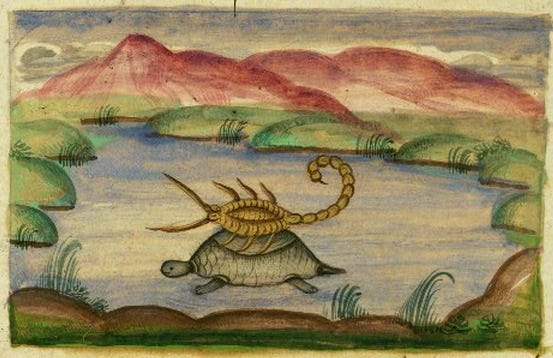An old Persian fable speaks of a scorpion asking a turtle to carry it across the river. "I won't sting you," promises the scorpion, "for then we'd both drown." Halfway across, the scorpion stings anyway, but the turtle survives—protected by its shell. The turtle then passes judgement.
For Iran, this ancient wisdom guides modern diplomacy: you can deal with scorpions, but only with proper armor.
Iran's latest diplomatic stance embodies this philosophy perfectly. But don’t expect to see this in Western media! (I wonder why)
As reported on July 31, 2025, Iran has set unprecedented preconditions for merely resuming talks with the United States: "US compensation for damage to Iranian facilities; US recognition of Iran's sovereign right to enrich uranium."
This isn't negotiating—this is demanding tribute just to sit at the table.
The brilliance lies in the reversal of traditional diplomatic dynamics. Usually, concessions come during negotiations, not before them. But Iran has learned that American promises made during talks evaporate like morning dew. So why not demand concrete commitments upfront? If America balks at preliminary guarantees, it proves they were never serious about keeping their word anyway.
This approach reflects the strategic calculations I outlined in "The ministry of Silly Wars": Iran doesn't need these negotiations as desperately as America thinks. With China purchasing 90% of their oil and Russia providing military technology, Iran has options. The question isn't whether Iran will negotiate—it's whether America is willing to pay the entry fee.
The demand for compensation particularly stings American pride. It forces acknowledgment that the June 2025 strikes were aggression, not self-defense. It monetizes the damage, creating a paper trail that can't be denied in future "misunderstandings." Most importantly, it establishes the principle: actions have costs, and those costs must be paid before expecting diplomatic rewards.
Recognition of enrichment rights strikes even deeper. For decades, America has treated Iran's nuclear program as inherently illegitimate, despite NPT rights. Now Iran demands this recognition as a precondition—not a negotiating point, not a concession to be earned, but a basic acknowledgment required just to begin talking. It's diplomatic jujitsu at its finest.
The timing reveals sophisticated strategy. With American stockpiles depleted from the June conflict—"approximately 25% of America's entire THAAD missile interceptor inventory"—and Israel's air defenses severely degraded, military options are limited. Iran negotiates from strength, not desperation.
This isn't about past grievances anymore. This is about establishing new rules of engagement. As I noted before: "How can you negotiate with someone that posts conflicting views every minute on X??"
Iran's answer: you don't negotiate with them—you make them pay admission before they can waste your time.
The Western media frames these demands as unreasonable, but consider the precedent Iran seeks to establish. Every future interaction begins with: "Show us you're serious. Put something irreversible on the table. Prove this isn't another Lucy-with-the-football moment."
By demanding compensation and recognition upfront, Iran creates a costlier framework for American betrayal. It's harder to walk away from negotiations you've already paid to enter. It's harder to deny rights you've already acknowledged. Every precondition is another layer of shell, another barrier against the inevitable sting.
Some argue this approach kills diplomacy. But Iran counters: what diplomacy? The kind where America negotiates in bad faith while Israel prepares to strike? The kind where sanctions relief becomes a shell game of ever-moving conditions? Better to acknowledge reality—the scorpion will sting—and prepare accordingly.
The era of free diplomatic engagement with America is over, replaced by a more transactional approach that reflects the real risks of dealing with an unreliable partner.
The demand for enrichment rights recognition is particularly clever. It doesn't ask for permission to build weapons or even to enrich to weapons-grade levels. It simply demands acknowledgment of what the NPT already guarantees. By making this a precondition, Iran exposes American hypocrisy: either international law matters or it doesn't. You can't selectively apply treaties based on geopolitical convenience.
This strategy also serves domestic purposes. The Iranian public, battered by sanctions and military strikes, sees their government extracting concessions before even talking. It demonstrates strength, validates resistance, and shows that patience has rewards. The turtle didn't just survive—it's now charging the scorpion ferry fees.
The brilliance lies not in refusing to negotiate but in making negotiation expensive for the other side. Iran will talk—for a price. They'll engage—with guarantees. They'll compromise—after compensation. The turtle learned that carrying scorpions is dangerous business. If you must do it, at least make them pay for the ride.
In the end, the turtle reaches the other shore, fee collected, shell intact. The scorpion can complain about the cost, but it got what it wanted—passage across the river. Iran offers the same deal: pay the price, acknowledge our rights, and maybe we'll ferry you across the diplomatic waters. Just don't expect us to do it for free, and definitely don't expect us to trust you won't sting.





This actually reveals the American and generally the Anglosaxon modus operandi. Its never about trading deals, but about deception, blackmail and looting. Its about taking it all leaving nothing for the others. Take India or China as examples. Or Ukraine..Or Irland. The countries where these people land are in mortal danger of extinction. Take Palestine. Take Japan or Germany or South Korea. Its always the same. American vassals are inevitably doomed to extinction. They will never accept the Iranian terms. An inch of fair play would be catastrophic for professional grifters. Meanwhile, the living conditions in America proper become more and more unlivable. A robust public infrastructure program is as unthinkable as the Iranian deal for the land of the thieves.